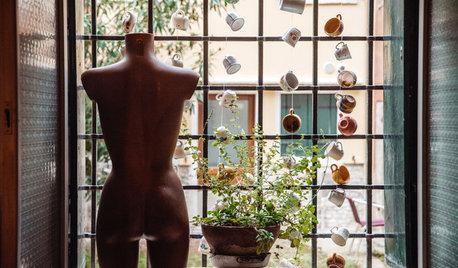"Serious Poetry" Part Two
dublinbay z6 (KS)
11 years ago
Related Stories

HOMES AROUND THE WORLDMy Houzz: In Italy, a Kind of Design Poetry Amid Books and Mannequins
This Venetian writer-professor’s apartment is its own magical universe of objects, creativity and memories
Full Story
KITCHEN DESIGNKitchen of the Week: Elegant Updates for a Serious Cook
High-end appliances and finishes, and a more open layout, give a home chef in California everything she needs
Full StoryLOFTSHouzz Tour: A Bachelor Pad’s Part II
A designer has a hand in two phases of this movie director’s life and his loft in a landmark Art Deco building in L.A.
Full Story
DOORSKnow Your House: Interior Door Parts and Styles
Learn all the possibilities for your doors, and you may never default to the standard six-panel again
Full Story
HOME INNOVATIONSHouzz Tour: Meet a Home Made With Minivan Parts
Sawn-off car roofs for the siding, windows popped out of van doors ... this California home is as resourceful as it is beautiful
Full Story
DECORATING GUIDESLast-Minute Dorm Decorating Guide, Part I
See how to make your college dorm room go urban-modern or prep with 5 easy pieces
Full Story
HOUZZ TOURSMy Houzz: Two Floors With a Daycare in a Toronto Victorian
Custom carpentry and an eye for antiques turn a rental apartment into a home that's like a hug
Full Story
LIFEHouzz Call: Show Us Your Two-Cook Kitchen
Do you share your kitchen with a fellow cook? We want to see how you make it work
Full Story
KITCHEN DESIGNTwo-Cook Kitchens Have Smart Space Chops
Seven Houzz users show off their clever solutions to having two — but not too many — cooks in the kitchen
Full Story



friedag
woodnymph2_gw
Related Discussions
Phoenix remodel part two:FURNITURE!
Q
After trees cut, part two
Q
Am I the only one Part two
Q
Do you clean before taking pictures of your home? Part Two
Q
dublinbay z6 (KS)Original Author
woodnymph2_gw
woodnymph2_gw
friedag
dublinbay z6 (KS)Original Author
friedag
dublinbay z6 (KS)Original Author
woodnymph2_gw
dido1
veer
dublinbay z6 (KS)Original Author
dido1
dublinbay z6 (KS)Original Author
woodnymph2_gw
veer
dublinbay z6 (KS)Original Author
dido1
dido1
dublinbay z6 (KS)Original Author
dublinbay z6 (KS)Original Author
dublinbay z6 (KS)Original Author
friedag
pink_warm_mama_1
dublinbay z6 (KS)Original Author